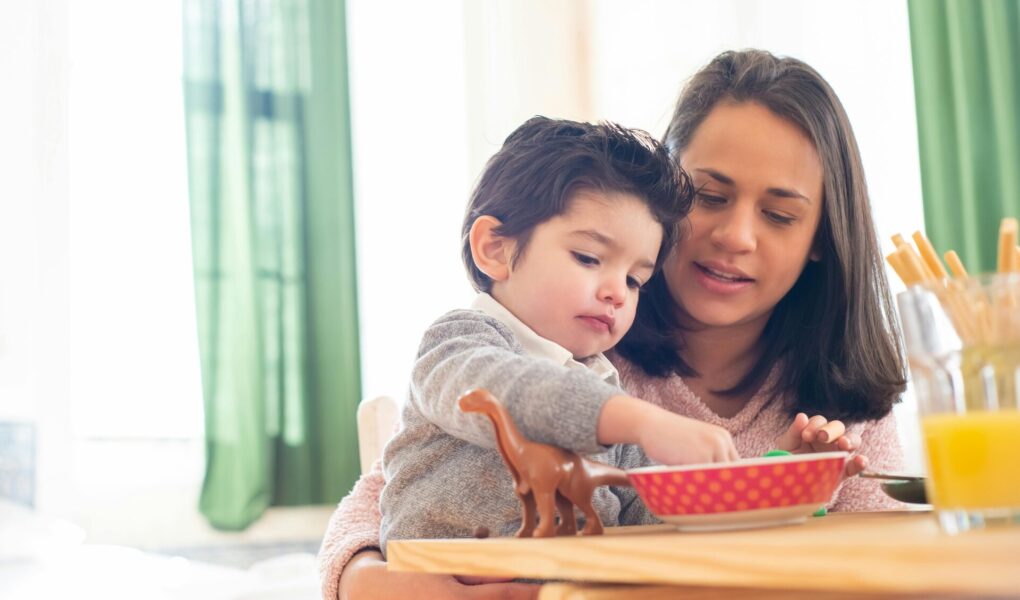Have you ever heard about mindful parenting? It’s a practice that encourages parents to be mentally present and focused when interacting with their children. This approach is important because it fosters a deeper emotional connection, improves communication, and helps manage stress for both parents and kids.
Mindful parenting allows parents to respond thoughtfully rather than reacting impulsively, creating a nurturing and supportive environment. Regardless of your parenting style, adopting a mindful approach can enhance your relationship with your children and support their emotional and mental well-being.
In simple words, what’s mindful parenting?
It means being aware of your feelings while parenting your children and allowing yourself to accept what is currently happening as it is.
As a mindful parent, you do your best to be present in the moment instead of reacting without thinking. Taking a moment to regulate your emotions, think, and then respond.
Mindful parenting helps parents work on impulsivity since it requires them to take a step back and think before they act.
How it looks like
We’ve all experienced those moments when our child is excited to share a series of stories with us that seem to never end. It can become challenging to keep up. Often, our minds wander, and we find ourselves responding with phrases like “Really?” or “Wow, that’s interesting,” without truly paying attention. In reality, we’re not fully engaged and may lose track of what our child is trying to share with us. We are basically on auto-pilot.
Mindful parenting encourages us to stay present and fully engaged with our children, embracing the current moment. It’s okay to admit that sometimes the stories might be long or less engaging, and that staying focused can be challenging. When we acknowledge this, we can work towards maintaining our awareness and connection, making our interactions more meaningful.
Am I a bad parent if sometimes I am on full auto-pilot mode with my kids?

No, you’re not.
Any parent that claims to be engaged 100% of the time is probably lying. There, I said it. It’s just not possible. There are days that we are just tired and overstimulated. All we want to do is relax. However, no matter how tired you might be, your kids will still need you. Whether it is to do homework, help them clean up, or to just share with you what happened at school.
On those challenging days, the best parenting you can give your children is switching to auto-pilot mode to ensure your children don’t feel ignored or like a burden. In those moments, you’re giving them the best of yourself, and that’s perfectly okay.
A word of caution: Although it is completely normal to not always be completely engaged, be mindful not to consistently fall into cruise control during every interaction with your kids. If you are always detached from all of your interactions, you run the risk of damaging your relationship, straining your bond, and leaving yourself out of touch with their daily lives.
7 Tips to Ace Mindful Parenting
1. Always be mindful
Even though auto-pilot will serve you well sometimes, make a conscious effort to be present in the moment without allowing your mind to wander off. Take in the good and the bad. Make mental notes of the things that you don’t like and think of ways to avoid them if possible, or to figure out how to make it better the next time you have to deal with an unpleasant situation.
At the same time, take in the good moments. Whether it is listening to a really good song, eating a delicious meal, or watching a funny movie. Oftentimes, we tend to overlook the little joys in life, only focusing on the big events. The thing is that life is usually packed with little everyday joys rather than big ones. Once you begin to notice how many good things are happening daily, it will make you feel happier and grateful for each day. This is the fuel that will help you keep going during the hard times.
2. Enjoy your shower
I know this one sounds a little weird but let me explain. Reframe your mind and start to think about your daily shower as self-care (which it is). Focus on how relaxed you feel when the warm water runs down your face. Allow your mind to dissipate any heavy thoughts as if they were being washed away as well. Use a soap with a fragrance that makes you happy, so when you come out, you not only feel refreshed but also as if your entire body has been infused with the most delightful aroma.
Play some music while you shower and gift yourself a serenade of your own vocal talent. Make that time a moment that is just for you. It will become a welcomed escape that will not only refresh your body, but also your mind and soul.
3. Be mindful while doing chores

I can already hear what some of you might be thinking, “I wish I didn’t have to do any chores at all, who would want to be mindful while doing them?” I hear you, but it would take a little change of perspective to be mindful while doing our daily tasks.
Instead of thinking “Man, I have to cook”, think “I’m gonna cook something delicious, I can’t wait to try it”. Most times the process of cleaning, cooking, washing our hands, etc., may not be the most enjoyable thing in the world, but the end result can be.
It’s completely ok to be mindful while doing chores and accept that it’s not fun and you hate doing them. But then focus on the end result and how much better everything is going to look once you’re done.
4. Allow yourself to say “Well, this sucks!”
Mindful parenting doesn’t tell you to shy away from the negative feelings or emotions that you might experience. This is extremely important. Even though it’s always good to look at the silver lining of things, sometimes things simply suck. We should be able to acknowledge this without experiencing the pressure of always being positive and look at the bright side of things. Doing so can often cause more damage than good. In fact, this phenomenon has a name; it’s called toxic positivity.
So, during those moments (or days) when things just feel awful, give yourself permission to acknowledge that you dislike it and you’re having a hard time. Accepting these feelings is a vital part of mindful parenting.
5. Try to find joy
Although you shouldn’t avoid accepting when things are tough, you shouldn’t stay in a pessimistic state either. Do your best to find joy in the things you do. Notice how neatly you chop the onions for lunch or how beautiful the meal looks. Delight in the smiles on your children’s faces when they proudly show you the painting they just drew for you.
Life is made up of the little moments you share every day. So, don’t skip them. Be mindful of the good things that happen to you and around you each day and allow yourself to simply be present. Embrace the moment and keep moving forward.
6. Be in the moment with your kids

I know that when raising young children, every day feels long and as if you’ll be doing this forever. But the thing is, this stage of their lives goes by much quicker than you think. Before you realize it, they are all grown up and you would be lucky to get a full sentence out of them.
Take in the good moments now. Watch them enjoy their ice cream, even if 90% of it ends up on their shirt. Enjoy their little kids’ laughter (you only have it for a short while), tuck them in at night and engrave in your memory how their little faces look when they are sleeping.
Be mentally present and focused when you are with your children, soaking in all these beautiful moments.
On the other hand, admit to yourself that although beautiful and endearing, the baby phase isn’t always fun. You are tired all the time and sleep deprivation can sometimes get the best of you. It’s ok to say that stepping on a pointy toy is one of the worst parts of parenting and that sometimes you feel an urge to throw all their toys out the window because you are tired of picking them up off the floor. Acknowledge that the preteen and teenage stage is one that sometimes can test your patience, and you often have to remind yourself that your child is a little hormone beast and that this stage shall pass.
Allow yourself to accept all of it. The good, the bad, the ugly, and the downright gross (explosive diapers anyone?!).
7. Take a moment before reacting
Do your best to avoid simply reacting to things around you. This won’t change overnight, especially if you tend to be impulsive or have an explosive personality. Instead, take a moment to regulate your emotions, process your feelings, and think through your responses and actions.
When your kids get into trouble or have a question, pause before you speak. This will give you time to consider the best way to address the issue or decide on the best course of action. By taking a moment to think rather than reacting emotionally, you’ll be able to make more level-headed decisions and handle the situation with a clear mind.
In conclusion
Mindful parenting encourages us to accept the moment as it is and to be mentally present in the things that we do. It helps us understand that we do not need to vilify our feelings when we are unhappy, while at the same time, encouraging us to enjoy the good times. Being present in the things we do allows us to be engaged with our kids, while at the same time helping us stay in touch with ourselves as well.
This is why every parent should be a mindful parent, regardless of their parenting style.
This is the beauty of mindful parenting, simply understanding that it’s more than okay to accept the moments for what they are, good or bad. Giving ourselves grace but also inspiring us to be mentally and emotionally engaged when we are raising our children.
So, I leave you to ponder on this question: Can you become a more mindful parent?
Psss… You might be interested in reading How To Practice Self-Care and Mindfulness as a Mom.




